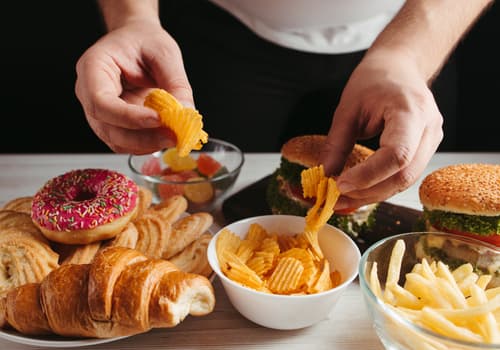Is junk food as addictive as some studies have claimed? Although all of us feel the need to satisfy such cravings on occasion, the fact of the matter is that the associated effects upon the body can be profound. Still, many individuals feel that the notion of addiction is “all in the head”. This is at least partially true. There are nonetheless some other variables to take into account. We will therefore look at how junk food affects the brain from a physiological as well as an emotional point of view. You might very well be surprised at what experts have discovered!
Appreciating the Chemical Effects of Junk Food on the Nervous System
Not only is junk food laden with artificial flavorings, colourings, and sweeteners, but many products are extremely high in saturated fat. If we are already aware that the effects of junk food are unhealthy and even dangerous, why do we continue to consume them in such high quantities? The main answer involves a small portion of the brain known as the “appestat“.
As you might have guessed, the appestat is a region directly linked to the appetite and feelings of satiety after having eaten. The problem here is that some fast food ingredients (such as monosodium glutamate) essentially “trick” the appestat into telling the brain that the body is not yet full. As a result, we eat entirely more than is necessary. It is now easier to understand why junk food is addictive and why the habit itself is difficult to break.

Not only is junk food actually addictive, it’s designed to be that way on purpose. So if you find it hard to stop eating sweets, salty snacks and heavily processed foods, it’s because food scientists, who know how the human body and brain reacts to certain stimuli in foods, specifically designed these foods to get you to keep eating them.
Most food manufacturers are profit-oriented, so they produce food in massive quantities using the lowest quality ingredients. That strategy is great if you’re a stockholder, but not so great if you’re a consumer. And definitely not if you’re a health or weight-conscious consumer.
And if that’s not bad enough, after the manufacturing process has stuffed all the food scientists’ knowledge of how to get us to eat more of their foods into the box, bag or tube, the marketers come in and blast us with images of irresistible foods.
Junk Food Examples to Avoid at All Costs
The term “junk food” is rather general in nature. Some substances are relatively healthier than others. Still, a handful of foods must be avoided at all costs if you wish to avert long-term consequences. These substances include:
- Turkey bacon
- Potato chips fried in hydrogenated fat
- Pork scratchings (such as pork rinds)
- The majority of foods offered by fast food establishments
- Commercially baked pizzas (such as frozen pizzas)
- Microwaveable dinners
As an example, potato chips are designed with what food manufacturers call the bliss point; the exact right combination of sodium, crunch and mouth feel to get you to keep dipping into the bag.
It’s not new, but it is news to many people that a huge percentage of packaged foods are engineered to be addictive. It’s been estimated that 80% of foods on grocery shelves in the US contain added sugar, perhaps the most highly addictive food substance in the known world. It’s good for repeated sales, but it’s definitely not good for your health and weight.
Many of the fast food ingredients associated with these examples have been linked to weight gain, hypertension (high blood pressure), obesity and adult-onset diabetes. It can still be tough to break such habits and this brings up yet another important topic.
A Look at Junk Food Addiction Symptoms
Do you feel as if you have come to rely upon unhealthy foods? If so, it is important to note some typical junk food addiction symptoms. Here are some common signals that a healthy change may be in order:
- Binge eating
- Eating to feel mentally and emotionally fulfilled
- Using junk foods as a coping mechanism during periods of anxiety or stress
- Feelings of guilt following a meal
- Difficulty quitting even if you are aware of the effects
- Hiding this habit from others
In other words, simply knowing how junk food affects the brain might not be enough to break a habit that has existed for years. When we consider the undeniable relationship between fast food and weight gain, the concerns before are even more profound.

Fast Food and Weight Gain: Change Your Habits with Spatz3
One frustrating issue is the simple fact that the junk food examples outlined above have permeated our daily lives. So, change will only take place once a conscious decision has been made. This is often both physical and symbolic (such as being fitted with a Spatz3 gastric balloon if we have obesity ). Once you have committed to a healthier lifestyle, the real work can begin. This is also a way to illustrate that you are serious about the decision itself; increasing the chances that you will follow through with your efforts.
How can you fight back? First, educate yourself. Watch documentaries such as Fed Up Forks over Knives and Food, Inc. that expose the public health risk associated with manufactured foods. More personally, you can up the quality of your food choices. The fewer junky, processed foods you eat, the sooner the desire for them will diminish. It means going cold turkey, but limiting your junk food intake for a few days will blunt the addictive hold it has over you and your food choices.
The more whole, real, minimally processed foods you eat, the sooner your brain and body will heal from its addiction to junk food. These healthful changes are ideal to make anytime, but especially in conjunction with your Spatz adjustable gastric balloon insertion.
It is still unrealistic to believe that you will be able to kick such a habit within a short period of time. It will likely require months of hard work. You might also be forced to modify specific routines (such as eating out with friends). This can be challenging and yet, the efforts are well worth the rewards. We are all aware that junk food is addictive. The only question remaining involves what steps we will take in order to lead happier and healthier lives.


